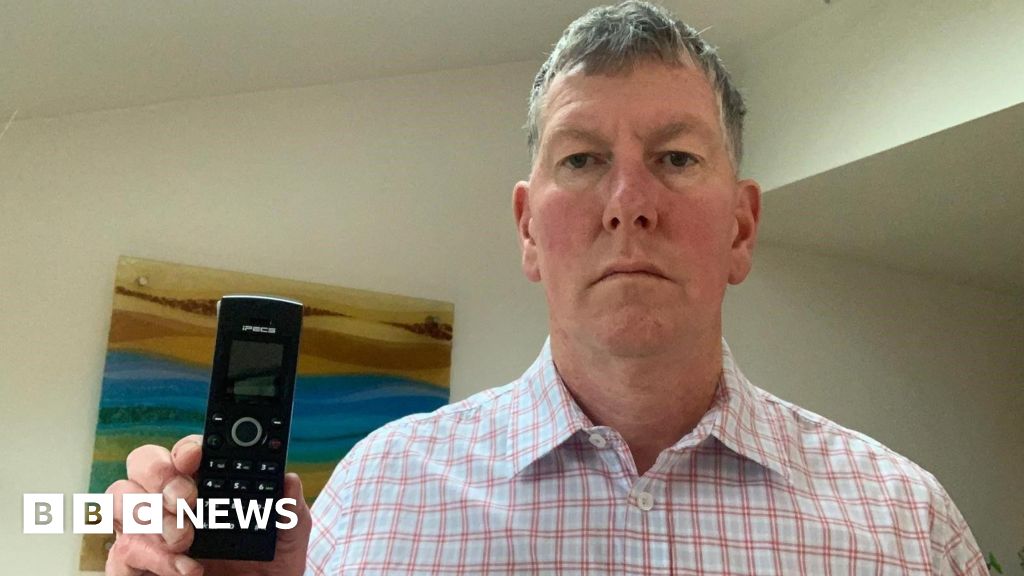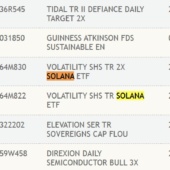An undercover investigation into the alleged mis-selling of phone contracts has revealed questionable sales practices, prompting calls for stronger regulation. The BBC has spoken to 12 small businesses who say they were misled.
“I feel sick every time I think about it,” says Paul Toplass.
“I’ve been in business for over 25 years. We’ve never experienced anything like this.”
Mr Toplass, who runs a pest control firm, says he was misled into signing a business contract for three phones that he is now “powerless” to break free from.
It has left him “being asked to pay over £10,000” for the phones he believes are worth less than £200 each.
Secret filming of a pitch by a representative of Hii Communications Ltd showed them making verbal promises that did not accurately reflect the contract terms and failing to highlight clauses around third-party finance and extra charges.
The Lincoln-based firm, also known as Hii Com, said it worked within “guidelines and rules set out by our funders”.
 Supplied
SuppliedMr Toplass, from Nottingham, claimed he was not told important facts about the contract he signed in February 2023.
He said he thought he was signing a two-year deal with Hii Com and did not know he was renting the phones under a finance arrangement with another company.
He had “completely trusted” the salesman, but lived to regret not reading the small print.
The contract stated that the equipment would be rented by a third party – the finance company Grenke – over 27 quarters.
Mr Toplass found he now owed more than £10,000, to be paid over seven years.
“They never at any point said we were entering a lease-hire contract,” he said.
“It’s morally wrong on every level. We do business and we are open and transparent with every one our customers. Upfront, fixed pricing.
“This business didn’t do any of that.”
Hii Com claims to have more than 3,000 customers.
The BBC secretly filmed a 90-minute sales pitch by a representative of the firm.
During the meeting, a would-be customer was told three times he would only be dealing with Hii Com. A lease hire agreement was not mentioned.
He was told he was signing a five-year contract totalling £18,100 and offered a “price promise” fixing the cost.
After an hour, the salesman asked him to sign a seven-page document.
However, having been made aware by the BBC of complaints from other businesses, the customer began looking through the contract in detail.
He found it contained extra costs after the first year and was for a longer term than discussed.
When questioned, the salesman offered to cross out seven different passages.
They included one detailing an “annual maintenance charge” of £983 after the first year, which the salesman said only applied if the customer had no insurance.
Asked repeatedly why the contract was for 84 months – two years longer than promised verbally – the salesman said the business would own the phones after five years and then pay for a “licence” during a two-year upgrade period.
‘On your own’
While consumer law gives individuals a cooling-off period after signing a contract, there is no such protection for businesses.
Mr Toplass complained to telecoms regulator Ofcom, only to be told it does not deal with individual cases.
He then turned to the Communications and Internet Services Adjudication Scheme (CISAS), but was told he lacked proof such as “photographs of the documents at the time that he signed them”.
CISAS concluded that “on the balance of probabilities” he had “agreed to contracts with minimum terms of 84 months”.
Mr Toplass said it was unrealistic to expect people to be able to provide the kind of photographic evidence wanted.
“You are on your own,” he said.

All 12 of the small businesses spoken to by the BBC claimed sales representatives had not drawn their attention to the third-party lease agreement or extra charges. Once they had signed, all were told they were tied in for seven years.
Shown the undercover footage, financial lawyer Arun Chauhan said: “Whatever is put in writing, you can see how these customers are being told one thing that they almost feel so trusting in that they don’t really need to read the agreement.
“I know that ignorance is no defence in terms of the law, but people get to the contract and they think, ‘I’ve been told everything I need to do’. So they sign it.”
He said he would like to think Ofcom or financial regulators would investigate further in light of the BBC’s findings.
Hii Com said: “All our customers are aware that they are entering a lease agreement from the outset.”
It said CISAS had also determined it had “behaved properly and correctly” in the case of Mr Toplass.
Grenke said it would be conducting a “full internal review” across its telecoms portfolio. It was committed to transparency but there was “an expectation and obligation that the customer completes their own due diligence”.

Miya Fu, who runs a scarves and accessories business in Manchester, said she agreed to meet Hii Com after a representative told her they were a BT wholesaler – a claim the company also made on its website.
She said she had “diligently checked” the contract and it was only when money started going out of her bank account that she learned she was locked into a seven-year agreement with a finance provider.
She felt “betrayed” and worried because “you never know what you’re going to be paying” every month.
BT said Hii Com was not an accredited BT Wholesale partner for fixed broadband products and services, and it was “concerned to hear about the examples raised by the BBC”.
‘Soul searching’
Dave Millett, an independent telecoms advisor, said few people knew CISAS was funded by the industry itself and there was “no obligation on any supplier” to sign up to it.
He called for “a genuine independent ombudsman”.
CISAS said complaints were “carefully assessed by a trained independent adjudicator with legal qualifications”. Businesses unhappy with the findings could reject them and pursue a claim against a provider through the county courts.
The Financial Conduct Authority said its regulatory powers did not give it the power to investigate the concerns highlighted.
For Mr Toplass, the experience has led to “soul-searching moments”.
“How have I got myself into this position, how have I put the business into this position?” he said.
“You do business every single day and you trust. It’s about trust with the person who sat opposite you.
“To then find out months and weeks later that you have been conned is not a nice feeling.”
If you would like to get in touch with your own experiences of sales techniques in the telecoms industry, good or bad, then please email yorksLincsinvestigations@bbc.co.uk – including a contact number if you would like to speak to a journalist.
Listen to highlights from Lincolnshire on BBC Sounds, watch the latest episode of Look North or tell us about a story you think we should be covering here.

















